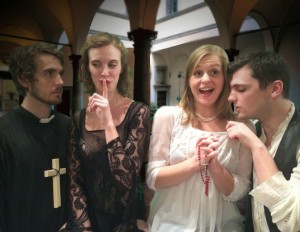DISREGARD BEAUREGARD
Much in the spirit of Ben Jonson’s salacious Volpone and Giovanni Boccaccio’s same-titled lascivious tale of irrepressible lust, Niccolò Machiavelli’s own political bombshell, his only surviving farce The Mandrake, is a devastating diatribe. Fueled by the same “the end justifies the means” mentality as his more famous The Prince, The Mandrake‘s almost too-easy target is the all-too-human hypocrisies that deny nature its due (of course, meaning sex). The latest in its season of “Sex and Sorcery,” Commedia Beauregard’s dogged revival, lamely directed by Lisa Cantwell, is not quite up to the dirty doings of this sprightly satire: It never achieves the liftoff that leads to serial laughs.
The plot, a series of successful deceptions, is as straightforward as the genre gets. Unlike later commedia such as A Comedy of Errors and A Funny Thing Happened On the Way to the Forum, there are no twists along its turns. Intrigue triumphs  too easily against fear and folly.
too easily against fear and folly.
With a cunning deadpan and sardonic slyness–but too little pleasure in her manipulations–Ellen Cribbs plays the rogue Ligurio (here transformed into Liguria), a trickster who’s hired by the doting young lover Callimacho (Mike Newquist, mugging up a storm). This amoral young cock wants to bed the beautiful but much repressed Lucrezia (Arin Mulvaney as a skittish ninny). Unfortunately, she is in a barren marriage to the fatuous Messer Nicia (bellowing Brad Cantwell), a born gull who desperately wants a child from his too-chaste Lucrezia.
Betraying the versatile chicanery of a shape-shifting press agent, Liguria enlists Lucrezia’s venal mother Sostrata (Melissa Reeves) and an easily bribed and elaborately corrupt friar (Matt Beard) to set Lucrezia up for sex with a sweet stranger. Callimacho convinces the easily beguiled Messer Nicia that he’s a doctor who can make Lucrezia fertile with a special potion made from the lust-stirring mandrake root. But its properties are such that the first person who sleeps with her  after this treatment will die. Of course, Callimacho will make sure that he’s the supposed sacrifice. Here everyone gets their way, even if it’s at the cost of Messer Nicia assiduously engineering his own cuckolding.
after this treatment will die. Of course, Callimacho will make sure that he’s the supposed sacrifice. Here everyone gets their way, even if it’s at the cost of Messer Nicia assiduously engineering his own cuckolding.
It’s a strange story to start with, but at the Raven Theatre it’s also half Boccaccio, half a prank out of Reality TV. Christopher Kidder-Mostrom manages to suggest nothing with his primitive set, neither 16th century Florence nor the ’90s’ grunge-rock scene of this adaptation. Yet the costumes by Mulvaney suggest the Renaissance, which confuses matters more than the plot. The time-traveling of this updated version inevitably creates a stylistic tension, with the prosaic garb and outrageous disguises flattening the action with too much familiarity. It looks like everyone’s doing Mardi Gras on the wrong day.
Rich in psychological pungency, Machiavelli’s cynical quips about human nature give the predictable plot some philosophical heft. But the staging itself seems too grounded in everyday absurdities, the timing a tad too careful, to achieve the escape velocity of self-propelled, raucously urgent screwball burlesque. However, the editorializing ballads, performed by Beard and Lina Chambers between scenes, vary the tedium of these two hours of forced fun.
photos by Brad Cantwell
The Mandrake
Commedia Beauregard
Raven Theatre Complex, 6157 N Clark St (at Granville Ave)
scheduled to end on February 9, 2014
for tickets, call 800.838.3006 or visit www.CBTheatre.org
for info on this and other Chicago Theater, visit http://www.TheatreinChicago.com


{ 3 comments… read them below or add one }
Hmmm… looks a lot like this review from 2011. Strange how these productions were so similar. Word for word even.
http://chicagotheaterbeat.com/2011/04/12/the-mandrake-chicago-review-a-red-orchid-theatre/
Yes, I borrowed from my previous review. Because the same problem arose at both A Red Orchid Theatre and Commedia Beauregard–an unfunny disconnect between Machiavelli’s often tedious script and a forced staging that didn’t trust that text and reverted to bad vaudeville. To prevent any self-plagiarism I should have found new words for a similar problem, especially in my characterization of the performances. Or, better yet, put quotation marks around my earlier assessment to avoid any confusing overlap. I did neither and that was a mistake that’s become my latest New Year’s resolution. Thanks, Simone, for pointing it out.
“… and the guy who played Siro was the absolute worst thing in the entire production! If I had been issued a rotten piece of fruit at the start of the show, I would have had a difficult time deciding when to throw it at his head! Yuck!”